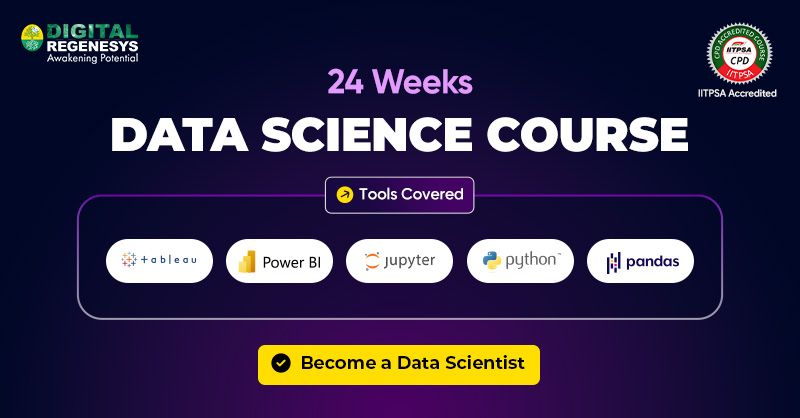Data-Driven Decision-Making in South Africa: How Data Science is Transforming Business Performance

Data-driven decision-making is transforming the way businesses operate by enabling them to leverage data science insights to enhance performance and competitiveness. As organisations collect vast amounts of data daily, the ability to analyse and apply this information effectively has become crucial. This transformation is supported by comprehensive data science courses designed to equip professionals with the skills necessary for analytics, machine learning, and business intelligence.
In this blog, we will explore a framework for data-driven decision-making in South Africa, including industry-specific case studies, measurable ROI, tech stacks, upskilling options, and how to initiate a successful pilot. You’ll also find answers to key FAQs, all tailored to the South African business landscape.
A Framework For Data-Driven Decision-Making in South Africa
For South African companies to compete globally and locally, understanding the framework is crucial. A successful framework for data-driven decision-making in South Africa begins with capturing accurate data, analysing it using advanced tools, and integrating insights into business strategies. This framework ensures that decisions are based on evidence, leading to better risk management and improved operational efficiency.
Key Components of the Framework
The process begins with identifying key business questions, followed by acquiring relevant and reliable data, such as:
- Data Collection: Gathering quality data from internal and external sources.
- Data Processing: Cleaning and preparing data for analysis using tools popular in South Africa.
- Business Analytics: Applying statistical and machine learning techniques to uncover patterns.
- Decision Integration: Using insights to guide business processes and strategies.
- Continuous Improvement: Monitoring outcomes and refining data strategies regularly.
Equally important is visualising data clearly so business users can understand trends without needing technical expertise. Business intelligence, in short BI in South Africa, is gaining traction, as organisations increasingly adopt platforms like Power BI or Tableau for this purpose. Finally, the insights must feed into decisions, whether it’s optimising marketing campaigns or reducing supply chain bottlenecks.
Read more: Why Learn Data Science in SA Right Now: Top Reasons to Start Today.

Case Studies from SA Industries
Several South African industries have successfully implemented data science to transform their business operations and enhance customer experiences. These practical examples illustrate how the real-world application of data-driven decision-making enhances both efficiency and profitability.
1. Retail Sector: Inventory Forecasting and Sales Optimisation
A national clothing retailer in South Africa integrated predictive analytics into their inventory management. By analysing historical sales data, seasonal trends, and local economic indicators, they were able to forecast demand more accurately.
2. Banking and Insurance: Fraud Detection and Credit Scoring
Financial institutions are leveraging advanced business analytics in SA to identify patterns in consumer behaviour that indicate fraud or credit risk. One local bank implemented machine learning algorithms to analyse transaction histories in real time.
3. Healthcare: Patient Care and Resource Allocation
Hospitals and clinics are also embracing data science to improve patient outcomes and resource planning. By analysing patient admission trends, one Johannesburg hospital predicted peak periods and adjusted staffing accordingly, which reduced patient waiting times by 15% and optimised the use of medical equipment.
These examples clearly illustrate the importance of data science for informed business decisions, not just for innovation, but also for day-to-day operational improvements. They also show how analytics case studies in SA are shaping the future of business.
Read more: Guide to Becoming a Data Scientist in South Africa
Proving The ROI Of Data Science: What South African Businesses Are Gaining
Companies that embrace data strategy in SA are better positioned to reduce waste, streamline operations, and improve decision-making. The company calculated a full return on its investment in under eight months. Investing in data science delivers tangible returns. The return on investment (ROI) of data science is increasingly evident for South African companies focused on optimising costs, increasing revenue, and enhancing customer loyalty.
Benefits Include
The ROI of data science becomes clearer when it is aligned with business goals and tracked through proper KPIs. The benefits of the return on investment (ROI) of data science include:
- Improved Decision Accuracy: Reducing guesswork leads to better strategic planning.
- Operational Efficiency: Automated data processes save time and reduce errors.
- Revenue Growth: Targeted marketing campaigns based on data insights increase sales.
- Risk Mitigation: Predictive analytics forecast potential issues before they arise.
When pitching data initiatives to stakeholders, it is essential to demonstrate both financial outcomes, such as cost savings and increased sales, as well as intangible benefits, including improved decision quality and enhanced customer trust.
You may also read on – Data Scientist Educational Requirements in South Africa
Barriers To Adoption
Despite the clear benefits, many South African businesses continue to struggle with fully adopting data science and business intelligence solutions. The challenges can be technological, cultural, or strategic, and often a combination of all three. Addressing these barriers through upskilling and investing in the right technologies is crucial for businesses to reap the benefits of data-driven decision-making in South Africa.
1. Skill Gaps
One of the most significant barriers is a lack of internal expertise. Many organisations lack employees trained in data science or analytics, and hiring externally can be expensive. Without the right talent, data remains unused or misinterpreted.
2. Data Quality Issues
Another barrier is the quality and accessibility of data. South African companies often operate on legacy systems that store fragmented or incomplete data, making it challenging to generate valuable insights. Integration between systems such as ERP, CRM, and sales platforms is often lacking.
3. Resistance to Change
There is also a cultural challenge. In some companies, decisions are still made based on intuition or hierarchy rather than facts. Creating a culture that values evidence over opinion requires leadership buy-in and organisational change.
4. Infrastructure Challenges
Finally, many SMEs in South Africa hesitate to adopt BI due to the perceived high costs and a lack of awareness about affordable tools. Overcoming these barriers starts with education, strategy, and access to real-world case studies, as offered in courses like the Regenesys Business Analytics course.
Read more: Detailed Data Science Curriculum in South Africa
Recommended BI Tools and Data Science Tech Stack for South Africans
For businesses ready to invest in data science, choosing the right Data tools in SA is vital. The South African market has access to a wide range of business intelligence (BI) platforms and data science technologies, many of which are cost-effective and scalable.
Top BI and Analytics Tools Used in South Africa
Selecting the right business intelligence tools and data science technology stack is vital. Popular tools used by South African enterprises include:
- Microsoft Power BI – Widely used for its affordability, integration with Excel, and user-friendly interface. Ideal for small to medium businesses.
- Tableau – Offers advanced visualisation and strong analytics capabilities. Often chosen by larger organisations.
- Google Looker Studio (formerly Data Studio) – A free tool for dashboard creation and data reporting, perfect for SMEs.
- Python & R – Popular programming languages used for advanced analytics, predictive modelling, and automation.
- SQL – Essential for querying structured data from relational databases like MySQL, PostgreSQL, and Microsoft SQL Server.
- Apache Spark – For handling big data at scale, used by enterprises in sectors like telecom or finance.
Each tool fits a different need, and selecting the right combination depends on your team’s skillset, data volume, and business goals. Many South African organisations start small with free or low-cost options before expanding to more complex tools as capabilities grow.
A data strategy in SA must also consider storage (e.g., cloud vs. on-premises), security (especially for customer data), and scalability.
You can read more from our blog on Why a Career in Data Science in South Africa is the Smartest Move in South Africa Right Now.
Upskilling Staff Via Regenesys
Hiring external consultants to manage your data is expensive and temporary. Building in-house capabilities through upskilling is more sustainable and cost-effective in the long term. That is where Digital Regenesys makes a real impact.
The Data Science course at Regenesys is designed to help South African professionals gain practical, industry-relevant data skills without taking time off work. Learners are introduced to core concepts in business analytics, machine learning, and BI tools, with real-world use cases tailored for local business environments.
Key Benefits of the Regenesys Data Science Course
- Flexible Learning: Online, self-paced modules fit into any work schedule.
- Career-Ready Curriculum: Focus on applied knowledge, not just theory.
- Industry Relevance: Case studies in SA and tools commonly used in local business contexts.
- Supportive Learning Environment: Regenesys mentors guide learners through challenges with a human, professional touch.
Regenesys also supports companies through corporate training courses, offering tailored learning paths that align with business objectives. Upskilling with Regenesys helps build internal analytics teams that are ready to tackle business challenges with confidence.
Know more about the Certification Course in Data Science at Digital Regenesys.
How to Start a Pilot
If you are unsure where to begin, launching a data science pilot project is a smart way to explore value before committing to large-scale investments. A pilot helps demonstrate tangible benefits in a low-risk setting and allows your team to build familiarity with methods and Data tools in SA.
Steps to Begin:
Starting a pilot project is an effective way to demonstrate the value of data-driven decision-making in South Africa before implementing it on a full scale.
- Start by selecting a high-impact, low-complexity use case, such as improving customer segmentation in marketing or forecasting product demand. Define clear objectives, such as improving email open rates or reducing stockouts.
- Next, assemble a cross-functional team with knowledge of the business area and basic data skills. Use accessible BI tools like Power BI or Google Looker Studio for early visualisation and testing. Regenesys can provide mentorship and guidance as needed.
- Document results and lessons learned, both successes and failures. If the pilot achieves its goal, you can make the case for scaling up and investing in deeper analytics capabilities.
A successful pilot is not just about performance but also about building a data culture. It demonstrates to stakeholders that data-driven decision-making in South Africa is both practical and beneficial. Piloting builds confidence and helps secure stakeholder buy-in for larger investments.
For more guidance, check our blog on Detailed Data Science Curriculum in South Africa
Contact For Corporate Courses
Digital Regenesys offers customised corporate training in data science and analytics for South African businesses of all sizes. Whether you are an SME seeking to train your marketing team or a large enterprise aiming to embed data culture across departments, Regenesys has flexible solutions.
Courses are business-aligned, future-fit, and focused on practical application — with a strong South African context. For HR teams and corporate L&D leaders, investing in employee data literacy can boost organisational performance and ROI.
Conclusion
Data-driven decision-making in South Africa is no longer optional; it is essential for business success. From retail to healthcare, local companies are already proving that data science delivers measurable ROI, improves efficiency, and drives more intelligent decisions. But the journey starts with the right strategy, tools, and skills.
Through case studies, frameworks, and best practices, we have demonstrated how South African businesses can begin small, develop data maturity, and transform their operations. The Importance of data science in today’s world lies in building internal capability, and that is where practical, career-ready courses from institutions like Digital Regenesys come in.
Ready to take your team to the next level? Visit the website of Digital Regenesys today to discuss corporate course options or build a tailored learning plan that supports your data strategy.
Last Updated: 18 September 2025
